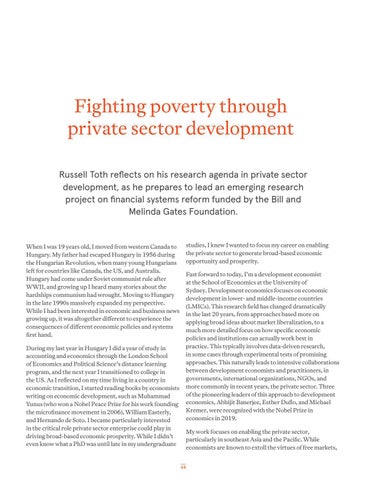Fighting poverty through private sector development Russell Toth reflects on his research agenda in private sector development, as he prepares to lead an emerging research project on financial systems reform funded by the Bill and Melinda Gates Foundation.
When I was 19 years old, I moved from western Canada to Hungary. My father had escaped Hungary in 1956 during the Hungarian Revolution, when many young Hungarians left for countries like Canada, the US, and Australia. Hungary had come under Soviet communist rule after WWII, and growing up I heard many stories about the hardships communism had wrought. Moving to Hungary in the late 1990s massively expanded my perspective. While I had been interested in economic and business news growing up, it was altogether different to experience the consequences of different economic policies and systems first hand. During my last year in Hungary I did a year of study in accounting and economics through the London School of Economics and Political Science’s distance learning program, and the next year I transitioned to college in the US. As I reflected on my time living in a country in economic transition, I started reading books by economists writing on economic development, such as Muhammad Yunus (who won a Nobel Peace Prize for his work founding the microfinance movement in 2006), William Easterly, and Hernando de Soto. I became particularly interested in the critical role private sector enterprise could play in driving broad-based economic prosperity. While I didn’t even know what a PhD was until late in my undergraduate
studies, I knew I wanted to focus my career on enabling the private sector to generate broad-based economic opportunity and prosperity. Fast forward to today, I’m a development economist at the School of Economics at the University of Sydney. Development economics focuses on economic development in lower- and middle-income countries (LMICs). This research field has changed dramatically in the last 20 years, from approaches based more on applying broad ideas about market liberalization, to a much more detailed focus on how specific economic policies and institutions can actually work best in practice. This typically involves data-driven research, in some cases through experimental tests of promising approaches. This naturally leads to intensive collaborations between development economists and practitioners, in governments, international organizations, NGOs, and more commonly in recent years, the private sector. Three of the pioneering leaders of this approach to development economics, Abhijit Banerjee, Esther Duflo, and Michael Kremer, were recognized with the Nobel Prize in economics in 2019. My work focuses on enabling the private sector, particularly in southeast Asia and the Pacific. While economists are known to extoll the virtues of free markets, 48
